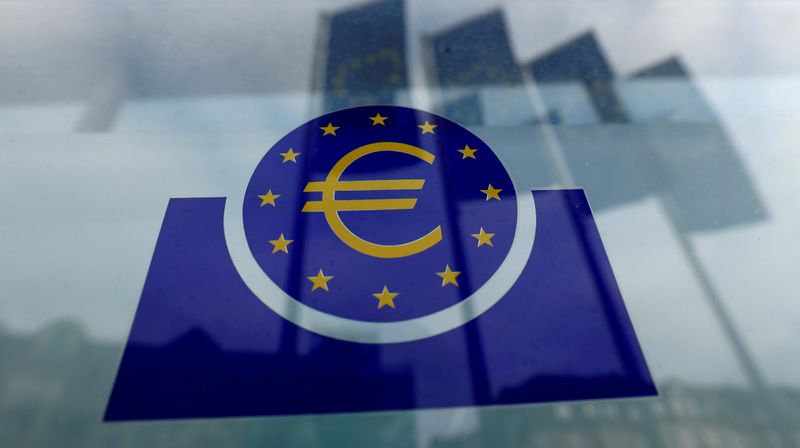By Balazs Koranyi and Francesco Canepa
FRANKFURT (Reuters) - As the coronavirus pandemic is slowly brought under control, the European Central Bank will have to phase out its emergency support measures. But with recent data showing euro zone inflation still far from its target and growth sluggish, other tools are likely to take its place.
WHEN DOES EMERGENCY SUPPORT END?
The 1.85 trillion euro Pandemic Emergency Purchase Programme (PEPP) has kept the 19-country currency bloc afloat through a double-dip recession but it was always intended to be a temporary measure and a revival in economic activity will open a discussion about when and how it should be ended.
PEPP formally expires in March 2022 and policymakers are unlikely to signal at their next meeting in June that they will start winding the scheme down, especially since government bond yields are already inching up to uncomfortable levels.
But keeping it going much longer may be problematic. Around 70% of the bloc's adult population could be fully vaccinated by the end of the summer and growth is set to surge as lockdowns end and the economy makes up lost ground over the next year.
That will make "emergency" measures harder to justify and leave further purchases under PEPP open to challenge, both within the ECB's Governing Council and in court, a potential threat to the central bank's credibility.
HOW WILL IT MANAGE THE TRANSITION?
The first step towards ending the scheme could be a shift in emphasis away from emergency buying of government bonds to the totality of the ECB's purchases under PEPP and its older Asset Purchase Programme (APP). The APP, which operates under more rigid rules, was introduced in 2014 to avert potential deflation in the bloc following the global financial crisis.
The ECB now buys around 20 billion euros of bonds under the APP each month, a figure that is dwarfed by the 80 billion euros bought under PEPP in April.
But there is nothing to prevent the ECB from ramping up APP while reducing PEPP, especially since the bank is still failing in its primary mandate of keeping inflation close to 2%, which was the justification for launching the older programme.
Consumer price growth is still only seen at 1.4% in 2023, far from the ECB's target and -- more importantly -- way below levels projected before the pandemic. That suggests the COVID-19 shock will linger for years, essentially requiring the ECB to keep up copious support.
WHAT DO POLICYMAKERS THINK?
Even Klaas Knot, the conservative Dutch central banker who has already made the case for starting to taper PEPP, has argued that ECB support including the APP must remain for now.
Policy doves from the euro zone's more vulnerable southern economies, including ECB Vice President Luis de Guindos and board member Fabio Panetta, have meanwhile argued that keeping stimulus in place for too long will be less costly than removing it too quickly.
Big government deficits are another reason the ECB will have to keep pumping in stimulus.
Next year's budget deficit forecast of 3% of GDP for the euro zone as a whole hardly looks realistic given that massive subsidies are keeping large chunks of the services sector from collapsing during the pandemic.
If those measures are removed quickly, firms could go bust and unemployment surge, further depressing inflation. If on the other hand they are phased out only slowly, governments will have to pick up the bill through higher debt, creating a drag on inflation via higher borrowing costs.
In either case, the ECB is on the hook and policymakers will oblige.
HOW WILL MARKETS REACT?
Fears of a negative market reaction also add to the case for signalling copious support beyond PEPP.
Investors get jittery when central banks discuss tapering: the ECB took a year and half to wind down bond-buying in 2017 and 2018, even as the bloc enjoyed its best growth in a decade.
There is little logic to removing support quicker when the economy is coming back from its biggest peacetime shock in a century.
The cost of shifting to the APP is that it doesn't allow the ECB to focus its purchases on countries that need it most, as it will have to follow pre-determined quotas at least roughly.
PEPP, in contrast, gives the central bank discretion over what, when and how much it buys.
But even the APP still offers some leeway. The ECB is meant to buy assets in proportion to each member country's shareholding in the ECB, but it has deviated from this "capital key" in the past and there is no reason to believe it would not do so again if needed.
